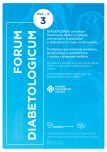Diabetes mellitus from the aspect of assisted reproduction
Authors:
Silvester Galo
Authors‘ workplace:
GYN-FIV a. s.
Published in:
Forum Diab 2023; 12(3): 98-102
Category:
Review Article
Overview
Assisted reproduction is a relatively rapidly developing field of medicine focused on the treatment of infertile couples. More than 45 years have passed since the birth of the first “test- tube baby”. Since that time various methods were developed to increase the success rate of the treatment. Spontaneous conception itself is conditioned by many factors, about which we still have relatively little information. The development of assisted reproduction techniques gradually reveals important processes and conditions that influence the development of a successful pregnancy. Diabetes mellitus and associated metabolic disorders have a negative impact on the quality of gametes, fertilization as well as the development of pregnancy. Identification and successful treatment of diabetes plays a key role before starting infertility treatment.
Keywords:
assisted reproduction – diabetes mellitus
Sources
- Njagi P, Groot W, Arsenijevic J et al. Financial costs of assisted reproductive technology for patients in low- and middle-income countries: a systematic review. Hum Reprod Open 2023; 2023(2): hoad007. Dostupné z DOI: <https://doi: 10.1093/hropen/hoad007>.
- Dai M, Guo W, Zhu S et al. Type 2 diabetes mellitus and the risk of abnormal spermatozoa: A Mendelian randomization study. Front Endocrinol (Lausanne) 2022; 13:1035338. Dostupné z DOI: <https://doi: 10.3389/fendo.2022.1035338>.
- Defeudis G, Mazzilli R, Tenuta M et al. Erectile dysfunction and diabetes: A melting pot of circumstances and treatments. Diabetes Metab Res Rev 2022; 38(2): e3494. Dostupné z DOI: <https://doi: 10.1002/dmrr.3494>.
- Kouidrat Y, Pizzol D, Cosco T et al. High prevalence of erectile dysfunction in diabetes: a systematic review and meta‐analysis of 145 studies. Diabet Med 2017; 34(9): 1185‐1192. Dostupné z DOI: <https://doi 10.1111/dme.13403>.
- Condorelli R, La Vignera S, Mongioì L et al. Diabetes Mellitus and Infertility: Different Pathophysiological Effects in Type 1 and Type 2 on Sperm Function. Front Endocrinol 2018; 9: 268. Dostupné z DOI: <https://doi 10.3389/fendo.2018.00268>.
- Jazayeri M, Alizadeh A, Sadighi M et al. Underestimated Aspects in Male Infertility: Epigenetics is A New Approach in Men with Obesity or Diabetes: A Review. Int J Fertil Steril 2022; 16(3): 132–139. Dostupné z DOI: <https://doi 10.22074/IJFS.2021.534003.1158>.
- Jonasson J, Brismar K, Sparen P et a. Fertility in women with Type I diabetes. Diabetes Care 2007; 30(9): 2271–2276. Dostupné z DOI: <https://doi 10.2337/dc06–2574>.
- Livshits A, Seidman D. Fertility issues in women with diabetes, Women's Health (Lond) 2009; 5(6): 701–707. Dostupné z DOI: <https://doi 10.2217/whe.09.47>.
- Dorman S, Steenkiste R, Foley P et al. Menopause in Type 1 diabetic women – is it premature? Diabetes 2001; 50(8): 1857–1862. Dostupné z DOI: <https://doi 10.2337/diabetes.50.8.1857>.
- Strotmeyer S, Steenkiste R, Foley R et al. Menstrual cycle differences between women with Type 1 diabetes and women without diabetes. Diabetes Care 2003; 26(4): 1016–1021. Dostupné z DOI: <https://doi 10.2337/diacare.26.4.1016>.
- López-López R, Huerta R, Malacara M. Age at menopause in women with Type 2 diabetes mellitus. Menopause 1999; 6(2): 174–178.
- Sekhar T, Medarametla S, Rahman A et al. Early Menopause in Type 2 Diabetes – A Study from a South Indian Tertiary Care Centre. J Clin Diagn Res 2015; 9(10): 8–10. Dostupné z DOI: <https://doi 10.7860/JCDR/2015/14181.6628>.
- Wang Y, Wang Y. Accelerated Ovarian Aging Among Type 2 Diabetes Patients and Its Association With Adverse Lipid Profile. Front Endocrinol (Lausanne) 2022; 13: 780979. Dostupné z DOI: <https://doi 10.3389/fendo.2022.780979>.
- Harbulák P. Vek a ovariálna rezerva. Slov Gynek Pôrod 2016; 23(1): 36–39.
- Wang Q, Moley K. Maternal diabetes and oocyte quality. Mitochondrion 2010; 10(5): 403–410. Dostupné z DOI: <https://doi 10.1016/j.mito.2010.03.002>.
- Wang Q, Ratchford M, Chi M et al. Maternal diabetes causes mitochondrial dysfunction and meiotic defects in murine oocytes. Mol Endocrinol 2009; 23(10): 1603–1612. Dostupné z DOI: <https://doi 10.1210/me.2009–0033>.
- Kotlyar M, Seifer D. Women with PCOS who undergo IVF: a comprehensive review of therapeutic strategies for successful outcomes. Reprod Biol Endocrinol 2023; 21(1): 70. Dostupné z DOI: <https://doi 10.1186/s12958–023–01120–7>.
- Sparić R, Andjić M, Rakić A et al. Insulin-sensitizing agents for infertility treatment in woman with polycystic ovary syndrome: a narrative review of current clinical practice. Hormones (Athens) 2023. Dostupné z DOI: <https://doi 10.1007/s42000–023–00494-y>.
- Teede HJ, Tay CT, Laven E et al. International PCOS Network. Recommendations from the 2023 international evidence-based guideline for the assessment and management of polycystic ovary syndrome. Eur J Endocrinol 2023; 189(2): G43-G64. Dostupné z DOI: <https://doi 10.1093/ejendo/lvad096>.
Labels
Diabetology Endocrinology Internal medicineArticle was published in
Forum Diabetologicum

2023 Issue 3
Most read in this issue
- Prevalence, screening and postpartum control of gestational diabetes mellitus among the insurees of the health insurance company Dôvera
- Metformin treatment and its effect on survival in patients with type 2 diabetes mellitus
- Infant of diabetic mother
- DIAEXPLORER: a survey of insulin treatment and incidence of chronic complications in type 2 diabetics in Slovakia
